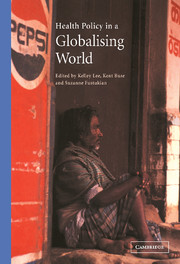Book contents
- Frontmatter
- Contents
- List of figures
- List of tables
- List of boxes
- Notes on contributors
- Foreword
- Preface
- Acknowledgements
- Abbreviations
- Part I
- 1 An introduction to global health policy
- 2 The public health implications of multilateral trade agreements
- 3 Globalisation and multilateral public–private health partnerships: issues for health policy
- 4 Global approaches to private sector provision: where is the evidence?
- 5 Regulation in the context of global health markets
- 6 Global policy networks: the propagation of health care financing reform since the 1980s
- 7 The globalisation of health sector reform policies: is ‘lesson drawing’ part of the process?
- 8 Cost-effectiveness analysis and priority-setting: global approach without local meaning?
- Part II
- Part III
- References
- Index
- References
2 - The public health implications of multilateral trade agreements
Published online by Cambridge University Press: 22 September 2009
- Frontmatter
- Contents
- List of figures
- List of tables
- List of boxes
- Notes on contributors
- Foreword
- Preface
- Acknowledgements
- Abbreviations
- Part I
- 1 An introduction to global health policy
- 2 The public health implications of multilateral trade agreements
- 3 Globalisation and multilateral public–private health partnerships: issues for health policy
- 4 Global approaches to private sector provision: where is the evidence?
- 5 Regulation in the context of global health markets
- 6 Global policy networks: the propagation of health care financing reform since the 1980s
- 7 The globalisation of health sector reform policies: is ‘lesson drawing’ part of the process?
- 8 Cost-effectiveness analysis and priority-setting: global approach without local meaning?
- Part II
- Part III
- References
- Index
- References
Summary
Introduction
An important feature of the modern global trading environment has been the establishment of a comprehensive legal and institutional foundation to regulate international trade in the context of a general desire to enhance political and economic stability. Since 1947, the General Agreement on Tariffs and Trade (GATT) has provided a rules-based regime to govern world trade, but has had limited powers of enforcement. In recognition of the expanding network and volume of world trade, the GATT evolved in 1995 into the World Trade Organization (WTO), an international organisation with the mandate to reduce trade barriers to goods and services and to mediate trade disputes between countries. Under the WTO, the rules and regulations that guide world trade are entrenched in multilateral trade agreements (MTAs) that are enforceable through a binding dispute resolution mechanism. The underlying assumption of the WTO system is that human welfare will increase through economic growth based on trade liberalisation in the context of non-discriminatory rules and transparency. From a public health perspective, this desirable goal requires linking the benefits of the global trading system to sound social policies (Drager 1999)
This chapter explores from a public health perspective the impact, actual and potential, of selected WTO MTAs on health policy, especially in low- and middle-income countries (LMICs). The purpose of this analysis is to suggest policy options for ensuring that existing, and any future, MTAs are more sensitive to public health issues.
- Type
- Chapter
- Information
- Health Policy in a Globalising World , pp. 18 - 40Publisher: Cambridge University PressPrint publication year: 2002
References
- 2
- Cited by



